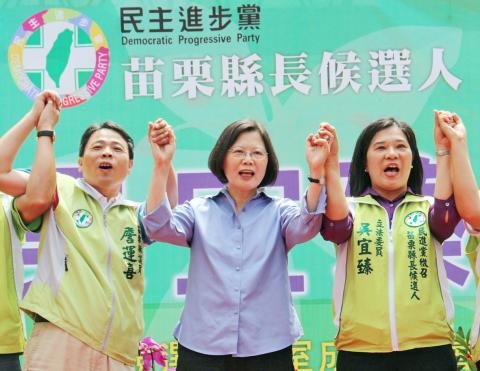Democratic Progressive Party (DPP) Chairperson Tsai Ing-wen (蔡英文) and former chairman Su Tseng-chang (蘇貞昌) yesterday expressed their disapproval of calls to freeze the Taiwanese independence clause in the party’s charter, a day before a party meeting scheduled for a discussion on the proposed freeze.
Tsai said the independence clause has been the party’s objective since its foundation, and it is also the ideal that party members and most Taiwanese have been pursuing.
With Taiwan’s democratization, the “Taiwanese consciousness” has been determinedly formed and these values of identifying with Taiwan and insisting on the nation’s independence and autonomy have already become a “natural ingredient” of the younger generation, Tsai said.

Photo: CNA
“How are we to freeze or abolish this fact or state?” she asked.
Tsai responded to the recent calls to suspend the independence clause yesterday on Google Moderator, a service that helps crowdsource questions and determine which questions interest users the most.
The DPP has been using it as an open platform to engage people on public policy.
She said the reason cited by those who propose mothballing the independence clause has always been the worry that the DPP would not be able to deftly deal with issues concerning cross-strait relations.
“This is a myth,” Tsai said. “People have to ask the question of who really defines the so-called Taiwanese independence framed by the media. Are we not an independent nation? Isn’t consolidating our sovereignty and demanding more substantive participation in the international arena what most Taiwanese are calling for?”
Tsai said the Resolution on Taiwan’s Future (台灣前途決議文) has been the consensus within the party about Taiwan’s sovereignty, future and relationship with China, and it has also become a consensus among the Taiwanese public.
“The DPP, based on this consensus, is aiming for a cross-strait relationship that is more stable and consisting of quality interaction and mutual trust,” she added.
She said that the DPP would be more confident, positive and practical in its attitude and measures, “showing its stability and consistency.”
The party would continue insisting on the principle and position that cross-strait interactions, regardless of form, should not be allowed to damage Taiwan’s democracy, sovereignty or Taiwanese will to determine their own future, Tsai said.
Separately, Su wrote on Facebook yesterday that Taiwan is an independent nation and that its future is in the hands of its 23 million people.
It is the mainstream public opinion, a social consensus of the highest degree and the DPP’s longstanding principle, Su added.
He said that the party’s 2014 China Policy Review: Summary Report (對中政策檢討機要) released in January was the result of scores of conferences with thorough discussions involving more than 600 people that spanned several months. The conclusion has confirmed the fortitude of the DPP’s basic values and core stance.
“The DPP should have confidence in its stance and in Taiwan’s mainstream opinion, clarifying its attitude [whenever needed] to avoid unnecessary misunderstanding from the outside and confusion within the party,” Su wrote.

‘TAIWAN-FRIENDLY’: The last time the Web site fact sheet removed the lines on the US not supporting Taiwanese independence was during the Biden administration in 2022 The US Department of State has removed a statement on its Web site that it does not support Taiwanese independence, among changes that the Taiwanese government praised yesterday as supporting Taiwan. The Taiwan-US relations fact sheet, produced by the department’s Bureau of East Asian and Pacific Affairs, previously stated that the US opposes “any unilateral changes to the status quo from either side; we do not support Taiwan independence; and we expect cross-strait differences to be resolved by peaceful means.” In the updated version published on Thursday, the line stating that the US does not support Taiwanese independence had been removed. The updated

‘CORRECT IDENTIFICATION’: Beginning in May, Taiwanese married to Japanese can register their home country as Taiwan in their spouse’s family record, ‘Nikkei Asia’ said The government yesterday thanked Japan for revising rules that would allow Taiwanese nationals married to Japanese citizens to list their home country as “Taiwan” in the official family record database. At present, Taiwanese have to select “China.” Minister of Foreign Affairs Lin Chia-lung (林佳龍) said the new rule, set to be implemented in May, would now “correctly” identify Taiwanese in Japan and help protect their rights, the Ministry of Foreign Affairs said in a statement. The statement was released after Nikkei Asia reported the new policy earlier yesterday. The name and nationality of a non-Japanese person marrying a Japanese national is added to the

AT RISK: The council reiterated that people should seriously consider the necessity of visiting China, after Beijing passed 22 guidelines to punish ‘die-hard’ separatists The Mainland Affairs Council (MAC) has since Jan. 1 last year received 65 petitions regarding Taiwanese who were interrogated or detained in China, MAC Minister Chiu Chui-cheng (邱垂正) said yesterday. Fifty-two either went missing or had their personal freedoms restricted, with some put in criminal detention, while 13 were interrogated and temporarily detained, he said in a radio interview. On June 21 last year, China announced 22 guidelines to punish “die-hard Taiwanese independence separatists,” allowing Chinese courts to try people in absentia. The guidelines are uncivilized and inhumane, allowing Beijing to seize assets and issue the death penalty, with no regard for potential

‘UNITED FRONT’ FRONTS: Barring contact with Huaqiao and Jinan universities is needed to stop China targeting Taiwanese students, the education minister said Taiwan has blacklisted two Chinese universities from conducting academic exchange programs in the nation after reports that the institutes are arms of Beijing’s United Front Work Department, Minister of Education Cheng Ying-yao (鄭英耀) said in an exclusive interview with the Chinese-language Liberty Times (the Taipei Times’ sister paper) published yesterday. China’s Huaqiao University in Xiamen and Quanzhou, as well as Jinan University in Guangzhou, which have 600 and 1,500 Taiwanese on their rolls respectively, are under direct control of the Chinese government’s political warfare branch, Cheng said, citing reports by national security officials. A comprehensive ban on Taiwanese institutions collaborating or